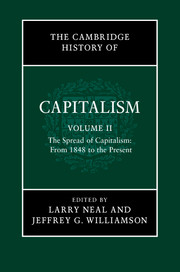Book contents
- The Cambridge History of Capitalism
- Reviews
- The Cambridge History of Capitalism
- Copyright page
- Contents
- Figures
- Tables
- Contributors
- 1 Introduction:
- 2 The spreadof manufacturing
- 3 Growth,specialization, and organization of world agriculture
- 4 Technologyand the spread of capitalism
- 5 Spread oflegal innovations defining private and public domains
- 6 Firms andglobal capitalism
- 7 Enterprisemodels:
- 8 Financialcapitalism
- 9 Internationalcapital movements and the global order
- 10 Capitalismand the colonies
- 11 Capitalismat war
- 12 Moderncapitalism:
- 13 Labormovements
- 14 Privatewelfare and the welfare state
- 15 Capitalism and human welfare
- 16 The futureof capitalism
- Index
1 - Introduction:
the spread of and resistance to global capitalism
Published online by Cambridge University Press: 05 March 2014
- The Cambridge History of Capitalism
- Reviews
- The Cambridge History of Capitalism
- Copyright page
- Contents
- Figures
- Tables
- Contributors
- 1 Introduction:
- 2 The spreadof manufacturing
- 3 Growth,specialization, and organization of world agriculture
- 4 Technologyand the spread of capitalism
- 5 Spread oflegal innovations defining private and public domains
- 6 Firms andglobal capitalism
- 7 Enterprisemodels:
- 8 Financialcapitalism
- 9 Internationalcapital movements and the global order
- 10 Capitalismand the colonies
- 11 Capitalismat war
- 12 Moderncapitalism:
- 13 Labormovements
- 14 Privatewelfare and the welfare state
- 15 Capitalism and human welfare
- 16 The futureof capitalism
- Index
Summary
- Type
- Chapter
- Information
- The Cambridge History of Capitalism , pp. 1 - 21Publisher: Cambridge University PressPrint publication year: 2014
- 3
- Cited by

